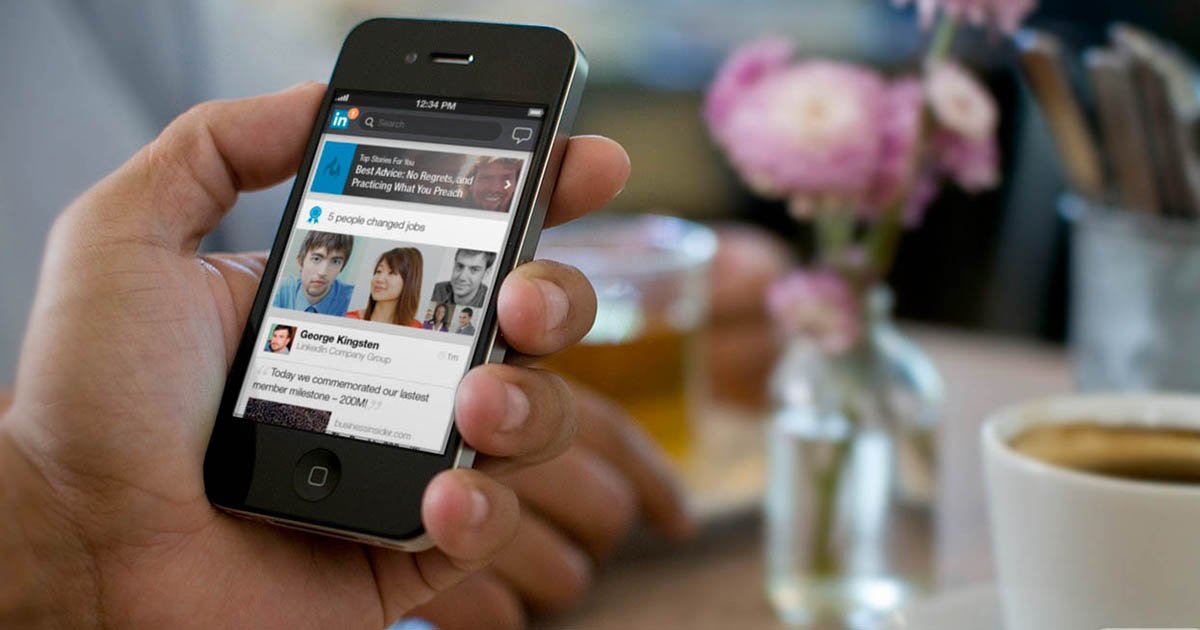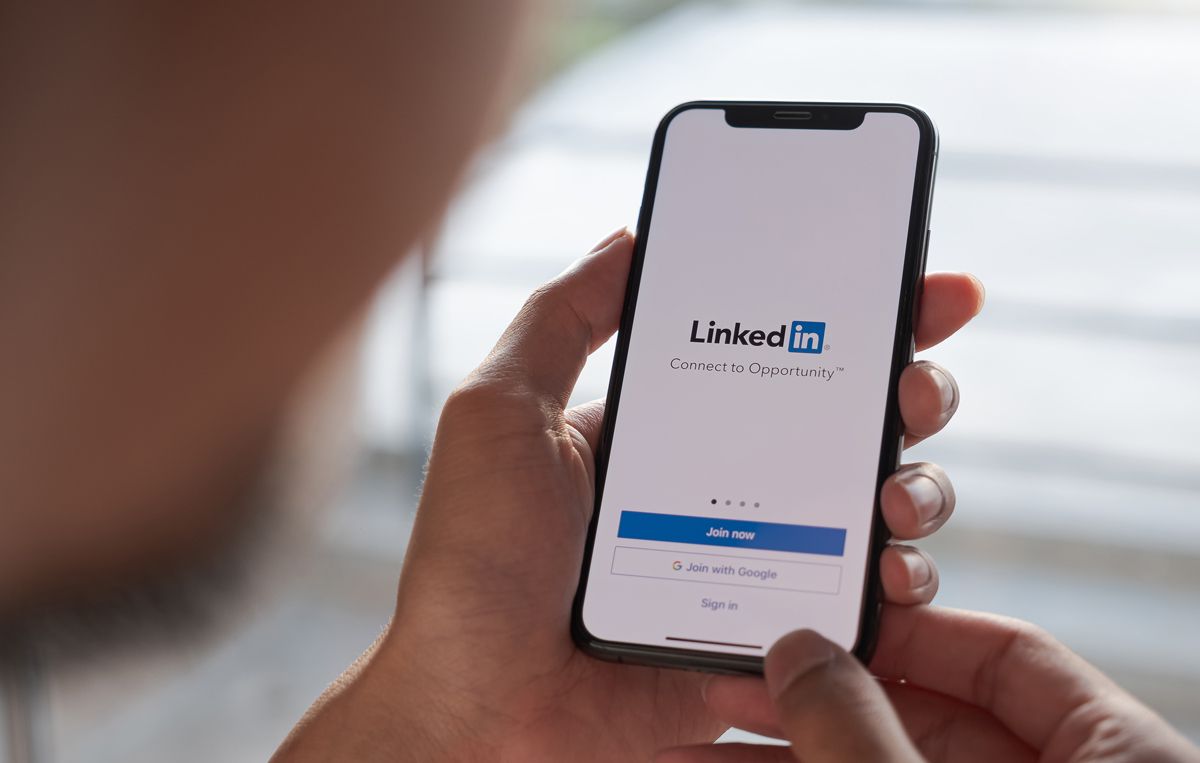LinkedIn has become the activity spot for 772 million users where they share insightful experiences and give meaningful advice. No wonder LinkedIn serves as a source of inspiration for 310 million people monthly.
Like every social media, LinkedIn isn’t limited to affluent personalities. It has a massive presence of brands too. In fact, 89% of B2B marketers rely on this platform for lead generation.
But all this glitz comes at a high cost. Your messaging on LinkedIn needs to be impactful enough to make you a standout. Otherwise, your business page can get lost in this oblivion quite easily.
So, do you know how to write a LinkedIn post that can help you stand out of the crowd? Well, creating LinkedIn posts that attracts your audience and make them stay is not a cake walk. But, don’t worry we’ve got you!
In this blog we will take a deep dive into strategies that will help you create successful LinkedIn posts. And yes, there is a suprise tool in between the blog to help you make these posts in mere seconds.
Let’s go!
7 Best Practices for Writing Effective LinkedIn Posts
To make them all see, click, share, and comment on your conetent, you need to consider the peculiarities of the LinkedIn audience and write your LinkedIn posts accordingly. The following seven strategies will help you do so.
1. Write for Your Audience
The first rule for crafting an effective LinkedIn post is to tailor your content to your audience. So, before putting a single word in the box, take some time to understand your audience.
Who are they? What are their interests, pain points, and aspirations?
To answer these questions, you need to gain a better understanding of your audience’s demographic and psychographic characteristics.
Confused by these terms? Let’s simplify them.
In demographic profiling, you gather data on your audience’s age, gender, location, education, income, and other quantifiable characteristics.
On the other hand,
Psychographic profiling unravels your audience’s personality, values, interests, and lifestyle and gives you a peek into their motivations, desires, and pain points.
The insights from both types of profiling will empower you to make better-targeted LinkedIn posts that will strike an emotional chord with your audience and foster genuine connections.
2. Diversify Your Content
Long story short, online content is about emotions and personal stories, not advertising. Users don’t read but scan it, looking for something that would reflect their inner world when they scroll through a newsfeed. LinkedIn is about business, so brand storytelling is what you need to master.
Tell your company’s story, chapter by chapter, for readers to dive into the highest possible reality.
Stories trigger emotions and therefore sell. Consider these rules:
- Every story has a hero.
- Every story has a plot.
- Applying to core principles of human perception and thinking in stories, you’ll hook readers and get a positive emotional response from them.
- Reflect human values in stories, and make sure your brand’s global goal resonates with them.
- Stories need to be unexpected yet relevant to your brand.
In the case of LinkedIn, tell your brand story through the following content types:
- Blog posts: Introduce them with a personal comment to engage readers and make them crave more.
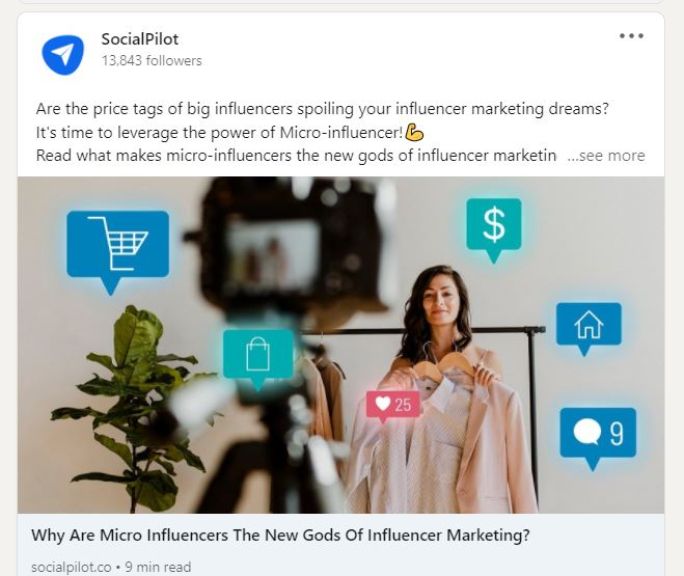
- Case studies, research, and industry news: build awareness and trust, turning your company page into a reliable information source.

3. How-to and list-style tips: They perform best on LinkedIn and get more likes and comments than other post types here.
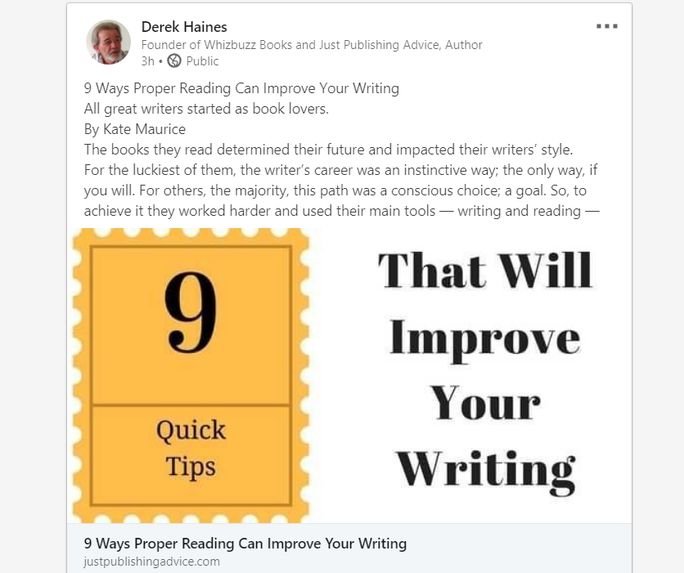
4. Company updates: Let people know what’s in there for them and how your new features will help them succeed.
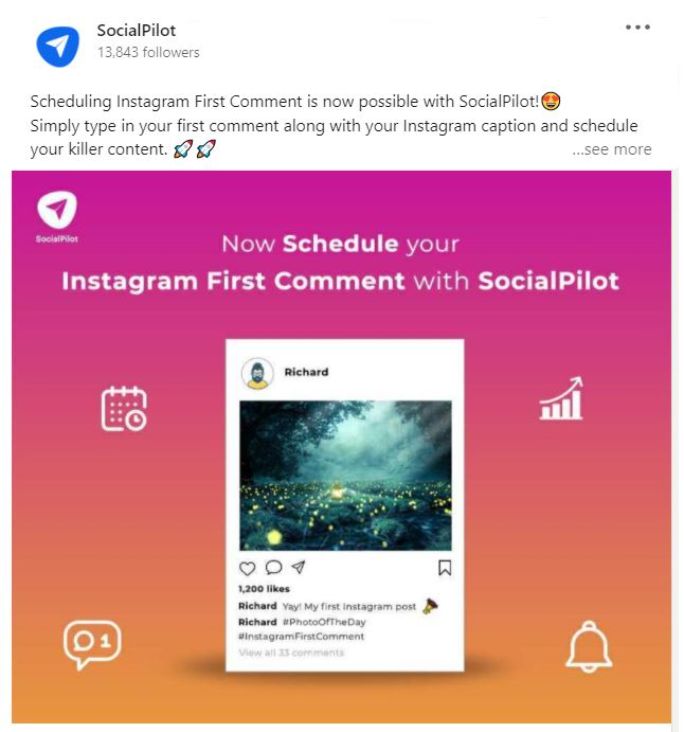
For LinkedIn members to click on your content, make it educational, informative, and relevant to their interests.
Remember, people come to this platform to grow professionally, not kill their time.
3. Master the Art of Structuring LinkedIn Posts
Given that reading online is 25% slower than in print be careful when structuring your LinkedIn posts.
First of all, focus at the very beginning and narrow your thoughts to the maximum. The golden rule here is “one post = one thesis.” Also, make the first sentence of your post eyebrow-raising. Write something that would create a wow effect and encourage readers to click on “See more” for further details.
Write a little-known fact, a behind-the-scenes experiment, a catchy quote, or an extraordinary insight. Use a conversational tone, and avoid professional jargon to engage a broader audience. If you’re sharing your experiences on LinkedIn or another social platform, consider using a LinkedIn scheduler to optimize your posts for maximum visibility. Also, write short sentences and always end them on a positive note.
Phew, too much to do, right?
Don’t worry, use our Linkedin Post generator to easily create attention-grabbing LinkedIn description that are perfectly structured and tailored to win your LinkedIn audience.
Linkedin Post Generator
Generate compelling, insightful LinkedIn posts effortlessly.
Here is the Generated Result

Create More for Free!
Get 500 Credits to Generate AI Content!
Since you’re an AI fanatic, we are offering you 500 Free Credits to generate awesome content on the AI Assistant of SocialPilot.
Our post generator is designed to craft top-notch Linkedin descriptions that follows the best practices. But if you haven’t given it a try yet, don’t worry, we’ve got some expert tips coming your way.
Let’s dive back into it!
As you remember, every online post is a story. So why not try starting it with a dialogue to hook your readers?
Also, use the 50% rule suggested by LinkedIn’s international editor Isabelle Roughol. Once you decide on the topic for your post, spend 50% of the time writing a perfect headline, while the other 50% will go to writing the post itself.
The more effort you put into LinkedIn headlines, the better.
Tips to consider here:
- The most views go to headlines of 40-49 characters in length.
- How-to and list-style headlines work best.
- Avoid posing questions in your LinkedIn post headlines.
On LinkedIn, it’s okay to post longer status updates (up to 15 lines), but only the first three are visible. Together with a headline, they should sound like a teaser for readers to click on “See more.”
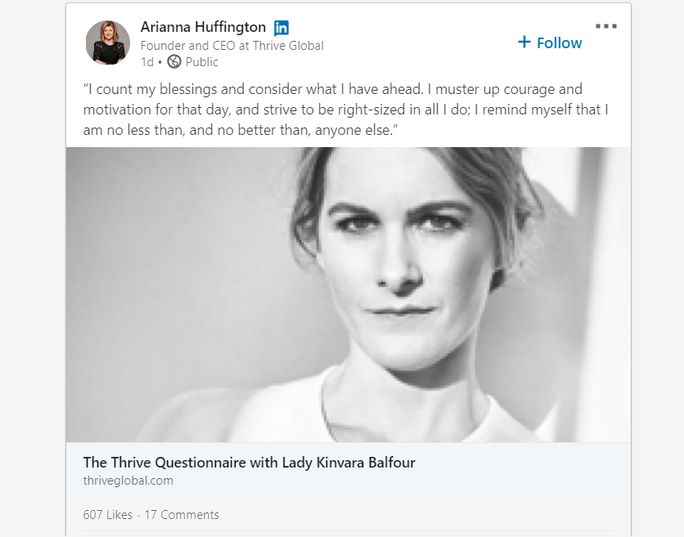
The above given is a primary example of what visuals to use in LinkedIn posts, applying to human psychology and, therefore, encouraging viewers to click.
4. Give Clear CTAs to Drive Engagement
While a captivating headline gives you a good start, an appealing call to action (CTA) will help you end your post better. CTAs are made to tell your audience what they need to do next.
So, what do you want them to do next?
You can spark engagement by posing a question in the comments section, leading them to your website, or kindly requesting them to share your post with their connections.
Good engagement bears so many good benefits as well.
The LinkedIn algorithm prioritizes the posts getting good engagement in feed rankings. Your post is more likely to appear frequently in the feeds of your followers’ connections if they have gotten good engagement.
5. Declutter Your LinkedIn Post Descriptions
LinkedIn is all about professionalism, and it absolutely loves a credible, long piece of information.
However, if you don’t pay attention to how you format those lengthy posts, they can be a bit of a tough read.
Now, what a loss it would be to pour your heart and years of experience into a post only to watch it disappear into the LinkedIn abyss because, well, it was just too hard to read.
That’s a bummer.
So remember to break those massive paragraphs into bite-sized one-liners. Small paragraphs are easy on the eyes and make the content digestible for the reader.
Here’s another hack!
Leave a little space between your catchy headline and the rest of your content, like three or four lines. LinkedIn will automatically tuck the rest of your post under a “read more” prompt, adding an element of intrigue.
Additionally, you must make judicious use of emojis and bullet points to make your content well-structured and make your content a breeze to digest.
6. Enhance Your LinkedIn Posts with Visual Elements
We bet you know that most people are visual beings, so they engage more when a social media post includes an image.
It works with all platforms, but text-only posts perform best on LinkedIn.
Yes, LinkedIn users are more readers than viewers, but it doesn’t mean you can’t grab their attention with visuals.
Charts and diagrams are perfect visuals to add when discussing case studies, trends, numbers, and updates.
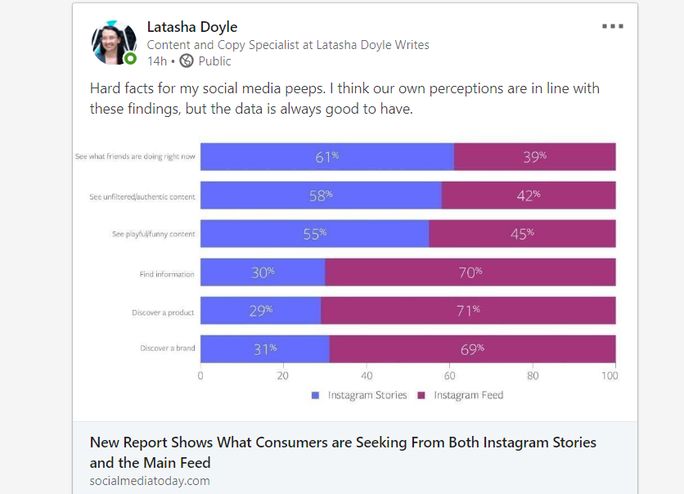
Given that LinkedIn users crave educational and informational content, you can pack it briefly to engage them and ask for feedback.
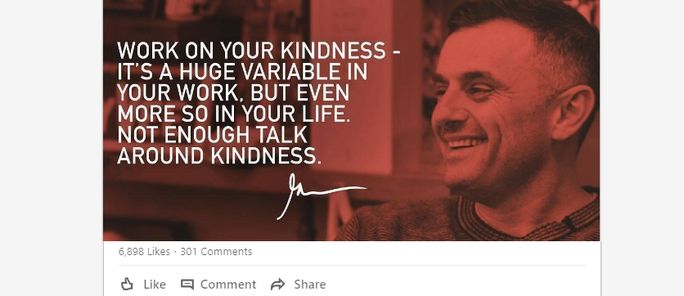
It’s nothing but human psychology. We are instinctively drawn to look at faces, which is why images of people work so well. Sure enough, it’s about posting experts in your niche or real people relevant to the context of your LinkedIn posts.
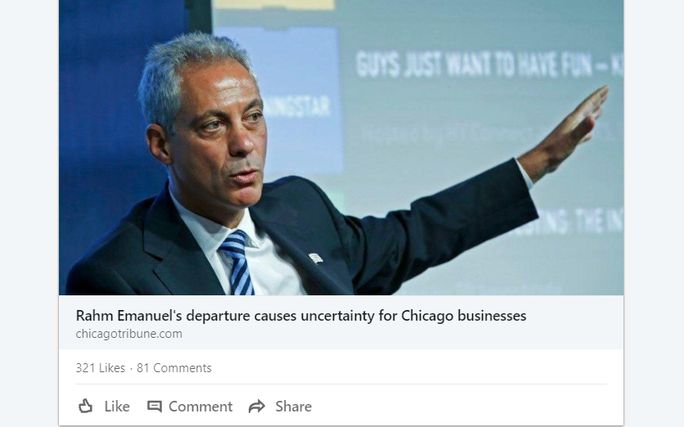
7. Harness the Power of Videos
One of the top marketers, Neil Patel, has recently nailed it on LinkedIn with video content. It got more popular than on Facebook or YouTube.

Do you believe that?
As per the numbers shared by HubSpot, among 38% of marketers using video content on LinkedIn, three-quarters of them reported it to be a successful tactic.
Why do LinkedIn users love watching videos on the platform?
- It helps them understand a brand, product, or service better.
- Videos are more convincing as they embody the “Show, don’t tell” principle.
- They know that videos on LinkedIn are relevant, and they will get the information they need by all means.
Try these video types to meet users’ expectations:
- LinkedIn is a platform for establishing relationships. So, a video story about your business and how you started it would come in handy.
- Also, you can post how-to’s about your product or service, demonstrating its features and teaching the audience to use it.
Like Uber did in their promo video, explaining a new chat feature for clients to use.
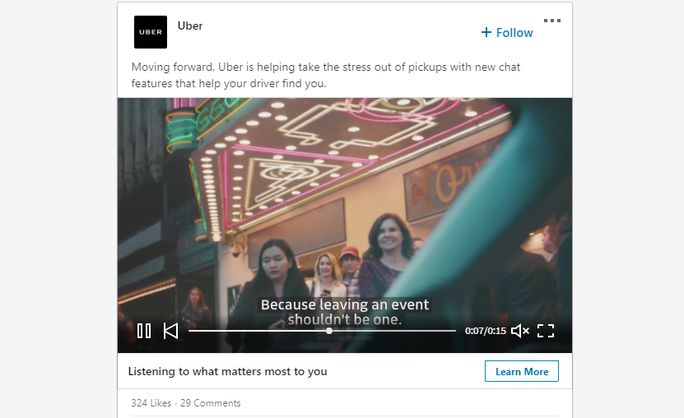
- Share previews of upcoming releases and events about your organization or your target audience’s interests.
- Interview niche experts and passionate people like Allen Gannett interviewed CMI vice president Cathy McPhillips.
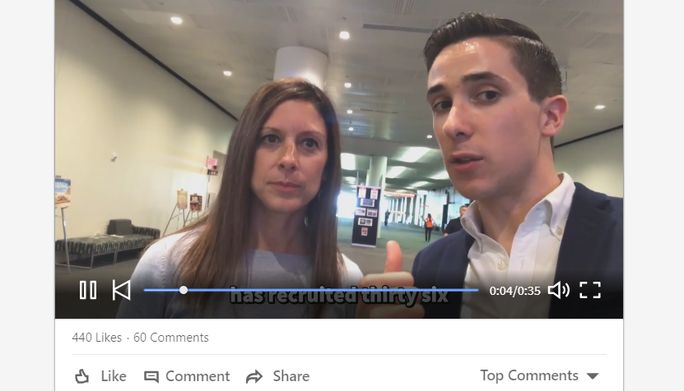
- LinkedIn is about learning and mentoring, so feel free to share lectures or business talks and opinions of leaders whose messages can resonate with your target audience.
Head of Social Impact on LinkedIn, Meg Garlinghouse, often posts such video content to engage followers.
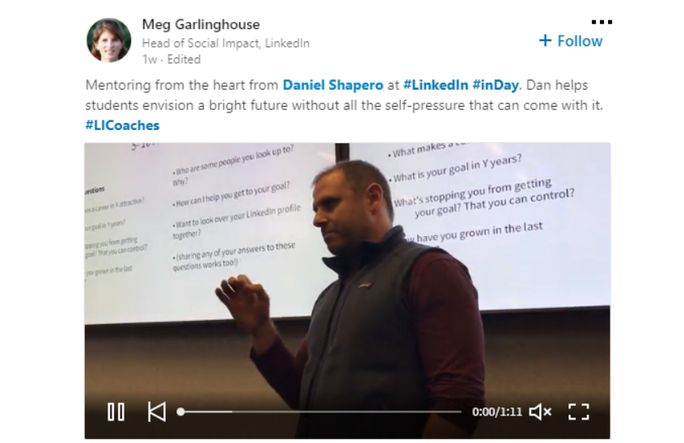
Keep your videos short, make them look professional, and don’t forget to optimize them for mobile to boost views and shares.
On top of that, video ads have come to LinkedIn too. Why not use them to drive even deeper engagement and more sales? The data shows that videos are 20 times more shareable than other content formats.
By the way, we have a killer way for you to publish your LinkedIn content with minimal effort. Let us show you how to nail your video strategy with SocialPilot.
How to Publish Native Videos on LinkedIn via SocialPilot?
SocialPilot, a LinkedIn scheduler, helps you publish and schedule native videos through these quick 3 easy steps.
Step 1: Login to your SocialPilot dashboard.
Step 2: Click on ‘Add Post’ in the top right-hand corner.
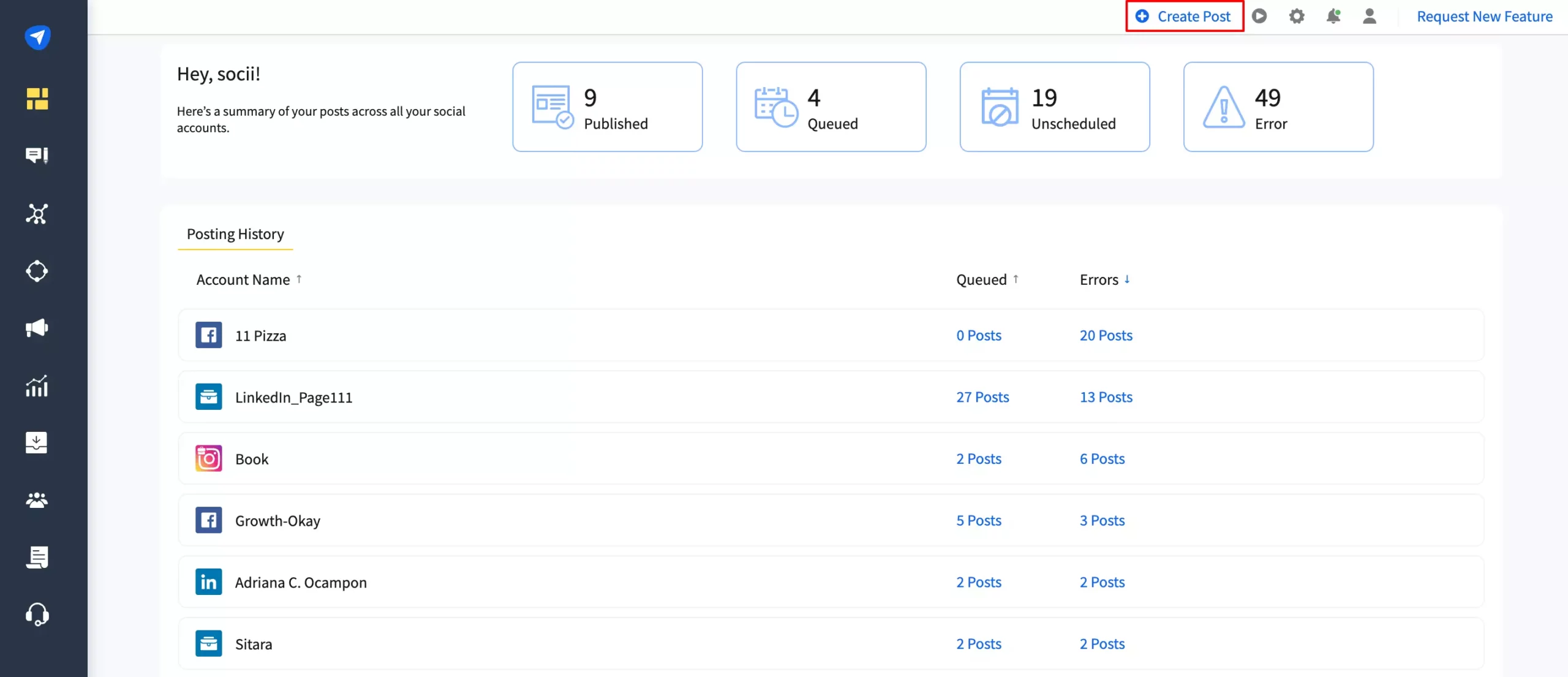
Step 3: Create your LinkedIn headline and post content. Upload your video either through Google drive, box, Dropbox, or your local computer.
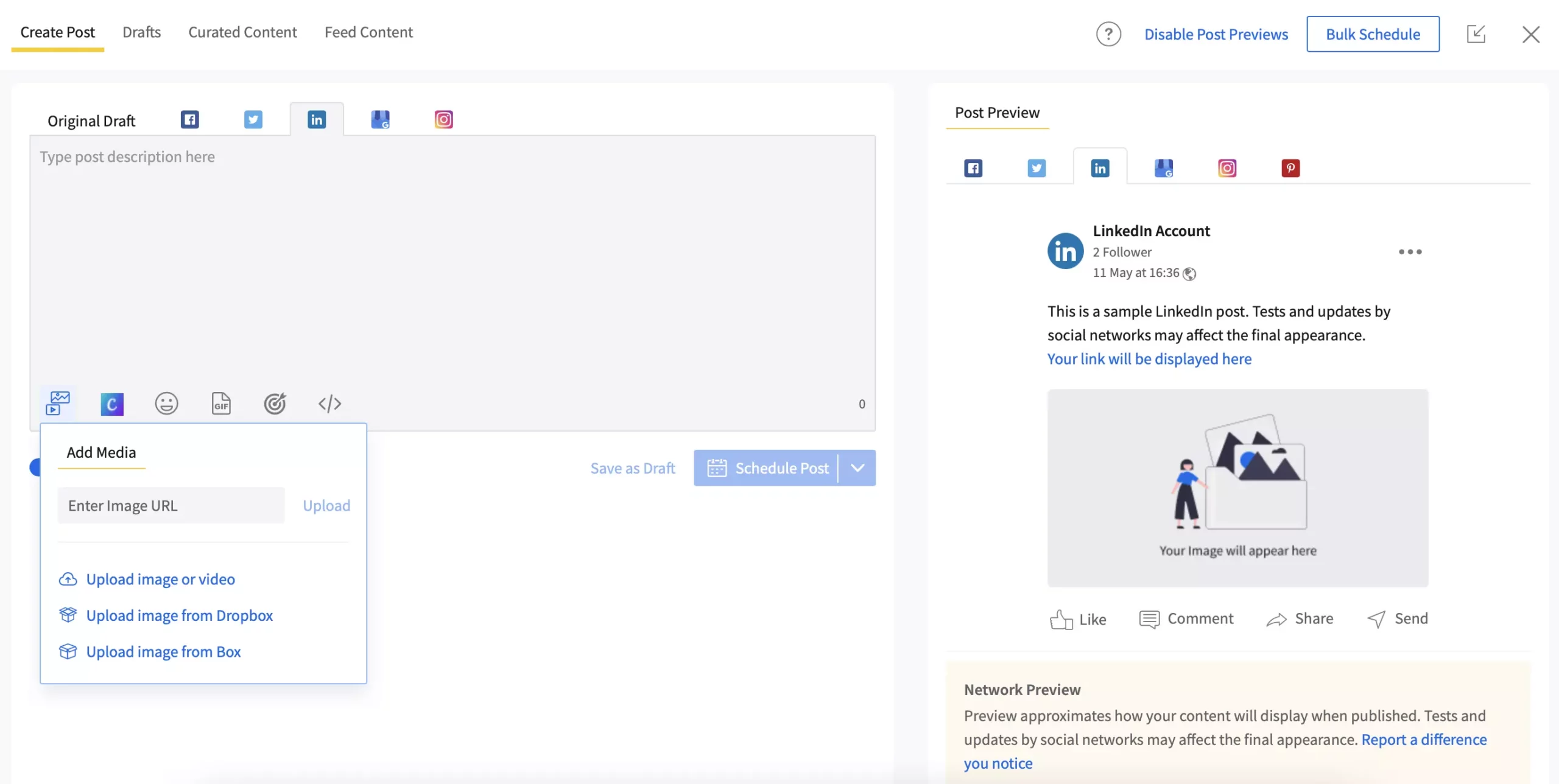
And voila! Your LinkedIn native video is ready to be shared now or scheduled for later.
Your Pre-Publish Checklist for LinkedIn Posts
To engage followers and, therefore, expand your network, stay consistent. Publish regularly to prove your knowledge and experience. It helps to build trust and gain more followers.
You can also save time by scheduling your LinkedIn posts using the best LinkedIn automation tools. It will help you to speed up your LinkedIn marketing activities.
Consider this checklist every time you plan to publish a status update on LinkedIn:
- Choose your content type to share, be it an informative or educational blog post, a how-to guide, a carousel document, data-driven research on the latest trends in your niche, a case study, or your company news or updates.
- You have crafted a perfect headline for your post, relevant to its context.
- You’ve proofread and edited your LinkedIn post for it to meet the rules of web-writing.
- When providing an image for your post, you’ve cared for it to be informative and valuable to a reader.
- Your LinkedIn video is short, to the point, and of high quality. Viewers will learn from it, and it will help them understand your brand better.
- Your company page on LinkedIn is for networking and PR, not direct sales.
- You are on LinkedIn to grow professionally and help followers grow with you.
In order to be sure about what is working and what is not, use LinkedIn analytics tools.
Final Words
You don’t have to be a top influencer on LinkedIn to boost engagement. Be honest, share valuable information, comment on others’ content, be consistent with updates, and speak on topics you are passionate about.
Focus on the quality and reliability of the information you share, and the positive feedback from your network won’t take long to come in.
LinkedIn does require a straining effort. It can make or break the reputation of your brand. But the good news is, if you manage to pull it off really well, you can outshine your competitors easily. The organic reach is brilliant, so you can easily reach millions of people without any ads.
The only catch is to stay consistent. As we discussed already, you can use SocialPilot for that. Take your free trial and start crafting your posts following all pointers, and surely you will ace the race.
